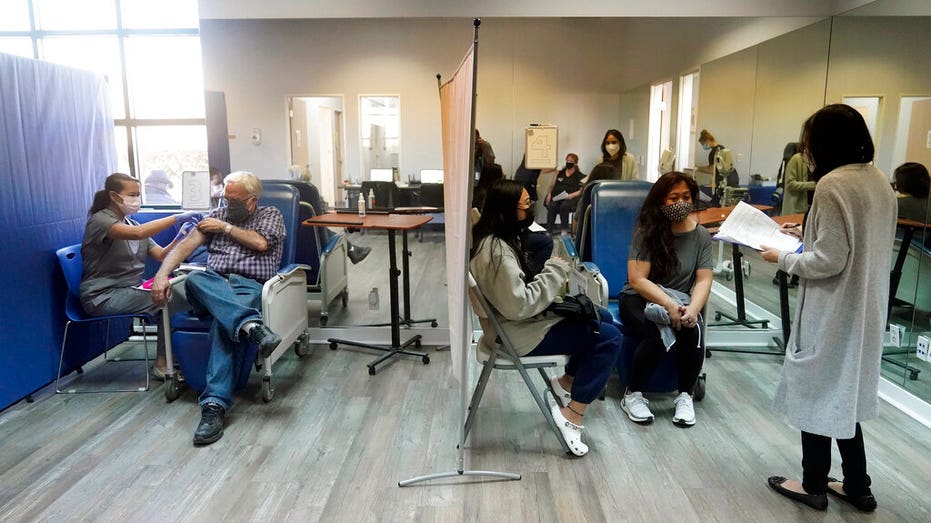California health officials say more COVID-19 vaccines going to rich than at-risk, poor communities
State data show how relatively few shots have gone to Latinos and Blacks compared to their populations
California health officials say that despite Gov. Gavin Newsom’s efforts to equitably distribute the COVID-19 vaccine to the state’s nearly 40 million residents, people who live in poorer communities are receiving the vaccine at lower levels than those who live in richer areas.
Newsom has partnered with the federal government to set up mass vaccination sites in working-class neighborhoods in Oakland and Los Angeles. He has also tasked insurer Blue Shield with centralizing California's patchwork vaccine system, asking the hospital chain Kaiser Permanente to assist.

Patients receive a shot of Pfizer's COVID-19 vaccine at Families Together of Orange County Community Health Center, Friday, Feb. 26, 2021, in Tustin, Calif. (AP)
Yet officials at community health centers that serve as the safety net for the poor in the U.S., focused on health equity, say they are not receiving enough doses for their patients — the very at-risk residents the state needs to vaccinate.
CLICK HERE TO GET FOX BUSINESS ON THE GO
In California, nearly 1,400 such centers offer free or low-cost services to about 7 million people, many in communities with a higher concentration of low-income families and few providers who take Medicaid – known in California as Medi-Cal. Many of their clients speak a language other than English, work long hours, and lack transportation.
Dr. Efrain Talamantes, chief operating officer for AltaMed Health Services, told The Associated Press it was disheartening to watch initial doses go elsewhere while his patients continued to test positive for the virus.
"There is a clear disparity every single time there's a resource that's limited," he said.
Most states are grasping for ways to distribute limited vaccine supply, resulting in a hodgepodge of methods in the absence of a federal plan. California allocates vaccine doses by eligible groups including teachers and farmworkers. The free-for-all has allowed people with the most resources to score scarce vaccinations.
As California has ramped up vaccination efforts through mobile and pop-up clinics at churches, work sites and schools, state data show how relatively few shots have gone to Latinos and Blacks compared to their populations.
African Americans have received 3% of vaccine doses while they make up 6% of the state. Latinos, who make up 39% of the state, have received 17% of doses.
STOCKS FUTURES RISE ON VACCINE PLAN, BONDS STABILIZE
Blue Shield officials say they plan to keep open health centers that are already administering vaccines, but the clinics worry they won't get enough doses.
Health centers watched in dismay as vaccine for health care workers initially went to larger hospitals in December. Then they watched as more affluent, internet-savvy English speakers with time to navigate web portals and drive long distances for appointments flocked to inoculation arenas.
When Orange County started opening large-scale vaccination sites in mid-January, community health centers asked for doses too, said Isabel Becerra, chief executive of the Coalition of Orange County Community Health Centers.
"We don't have transportation. We don't speak English. We don't understand the technology you're asking us to use to register and get in line. So, can we vaccinate the 65 and older population in the comfort of their own facilities?" she said.
Jodie Wingo, interim president of the community health association for Riverside and San Bernardino counties, said member clinics were scaling up to inoculate more of their 500,000 patients. But now they're receiving only a few dozen doses at a time.
"Everybody is working toward equity, yet it doesn't look equitable. At all," she said.
CLICK HERE TO READ MORE FROM FOX BUSINESS
Reached for comment by Fox Business, the California Department of Public Health (CDPH) shared concrete steps it is taking to "ensure equity."
"Equity is the state's 'North Star' and California is committed to health and racial equity," read a statement provided by CDPH. "The COVID-19 pandemic has highlighted not only the disproportionate impact of this virus but also the importance of focusing interventions and resources to address the health of those disproportionately impacted, including communities of color and the disabled."
The Associated Press contributed to this report.




















